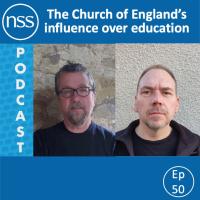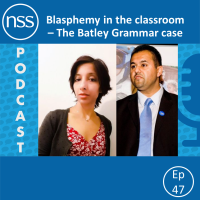
21st Century RE for All
We want every pupil to have the same entitlement to high quality, non-partisan education about religion and belief. We want to see all schools preparing young people for life in modern Britain by teaching pupils about the diversity of religious and non-religious worldviews.
We're campaigning for an end to the arbitrariness and unfairness of local determination in Religious Education and for a national religion and belief education syllabus as part of the National Curriculum.
What’s the problem?
Religious education is out of date and in need of reform. Almost thirty years after the introduction of a national curricular entitlement for all pupils, one subject remains exempt – religious education. Unlike any other compulsory subject RE is determined at a local level.
In each local authority the local agreed syllabus for religious education (RE) is determined by 'Standing Advisory Councils on Religious Education' (SACREs), largely made up of religious representatives, with non-religious representatives either excluded or barred from voting.
Even worse, many faith schools don't even need to follow the locally agreed syllabus, and can instead teach their own syllabus and teach religion from their own exclusive viewpoint.
If there is a body of knowledge called 'Religious Education', which is worthy of being taught at all, it should be offered to all children wherever they live. There are simply no grounds for discriminating on grounds of geographic location or school type. If a programme of study covering religion and belief deserves to be included in the school curriculum, it should be offered to all as a basic entitlement for every future citizen. This is simply a matter of fundamental justice and equality.
Importantly, the subject must be broad, balanced and inclusive. Religious interest groups should no longer determine what gets taught. As with other subjects, the syllabus should be nationally determined by independent educationalists without an agenda motivated by a specific religion or belief.
"The structures that underpin the local determination of the RE curriculum have failed to keep pace with changes in the wider educational world. As a result, many local authorities are struggling to fulfil their responsibility to promote high-quality religious education"
OFSTED report 'Religious Education: Realising the Potential'
Get involved
With the General Election coming up, as a nation we're thinking about our future. Please consider asking your candidate to support common sense secular reforms — such as reforming religion and belief education — that will make our society, education system, and laws fairer for all.
It’s time to take religious education in schools out of the hands of religious councils. Support a national entitlement to high quality, non-partisan education about religion and belief.
Sign the petition-
A selection of comments from the petition. Supporters on what this campaign means to them and the need to reform religion and belief education.
Find out more
NSS submission to the Commission on Religious Education
We’ve called on the Commission to support pupils’ basic entitlement to non-partisan education about religion and belief, and an end to RE controlled by religious groups or faith schools.
Religious Education and the law
RE is a statutory part of the basic curriculum in all schools, but is often shaped by local religious groups and faith schools.
Your rights: Withdrawal from RE and Collective Worship
We advocate comprehensive non-partisan reform of religion and belief education and an end to compulsory worship in schools, so no one has to withdraw from any part of the school day.
Why Religious Education must be reformed before ending parental opt-out
The right to withdraw from RE may sometimes be problematic, but is still necessary when until vestiges of confessionalism, proselytization and poor practice remain.
Standing Advisory Councils on Religious Education
Dominated by religious representatives, SACREs determine the RE syllabus at a local level.
Related news and opinion
Schools must be supported against religious bullies
Posted: Wed, 7 Jul 2021 16:55
Comments from Ofsted's chief inspector highlight the need to help schools resist efforts to shut down teaching which reactionary religious groups deem controversial, says Alastair Lichten.
In a recent speech at the annual Festival of Education conference Amanda Spielman, head of Ofsted, touched on issues with activism in schools. While acknowledging the many positive contributions of activism to education, she criticised "the militant kind" which leads to "confrontational approaches both outside and inside schools".
She went on to talk about the impact on children having to "cross what amount to picket lines outside their school because one group's religious beliefs – protected by law – sit uncomfortably with teaching about another group's sexuality – also protected by law".
We've seen this play out with protests outside school gates and misinformation campaigns organised against relationships and sex education (RSE). In Batley a mob forced a religious education (RE) teacher into hiding over a lesson on blasphemy - and reactionaries have since hounded the Labour candidate during the recent by-election with homophobic abuse, largely because of her support of inclusive RSE.
It's important to cut through the euphemism and talk about the specific subjects and topics that reactionary religious groups are organising around. They want schools to uphold taboos against LGBT identities, contraceptives, sex and blasphemy. They use euphemisms such as protecting children – a longstanding dog whistle used to frame LGBT people as a threat and talk the language of community engagement – when they want to be treated as gatekeepers regardless of what the wider community may want.
Currently it is conservative Islamic groups leading the charge, but this is not confined to one group. Anti-LGBT Christian groups have supported these protests. How long before other religious groups start mobilising on their own pet issues? Some white parents object to schools teaching about racism and colonialism. Some Hindu groups are bitterly opposed to caste discrimination being mentioned in A-level coverage of Hinduism. Where religious authorities control schools, very little outside pressure is needed to enforce such taboos.
The number of schools that will have religious mobs baying at their gates may be relatively small, but many more will be intimidated into silence. We've seen these tactics and the effects they have before. In 2011 researchers at Penn State University published a study showing that only 13% of US science teachers were sympathetic to creationist beliefs, but the real threat to scientific literacy was the 60% who avoided teaching about evolution to avoid conflict or controversy.
RE students tend to be particularly interested in discussions about the conflicts between religious beliefs and wider societal values. Examiners have told me that questions about religious objections to abortion or providing services to LGBT couples are among the most popular options chosen in exams as they are perceived as more relevant than scriptural questions.
If you want to discuss contemporary religious issues, then I can think of very few more pertinent than debates over offending Islamic blasphemy taboos. Any student passionate about RE would love to debate the lines between free speech, religious criticism, and needless offence. After Batley, many won't get the chance. I expect many teachers will be quietly putting that particular lesson plan in the bin.
I suspect that few teachers or schools will actively support Islamic, or other religious, blasphemy taboos or homophobia, but many will seek to avoid this conflict. There are currently structural issues of religious privilege within RE and RSE which encourage this strategy for schools, and which encourage religious parents to demand concessions.
Religious education
Our system of religious education assumes that religious groups should be gatekeepers and producer communities - meaning they should decide, through the system of SACREs and their dominance of the market in resources, how religions are covered.
Good teaching about religion should challenge prejudice against and between people with differing beliefs. Challenging discrimination is not always consistent with protecting everyone's religious feelings. An academic study in 2018 showed that most RE teachers see it as their job to address prejudice by prioritising positive views of religion over critical exploration. Evidence from the same authors, reported last week, suggests this holds regardless of teachers' personal beliefs. This positivity bias primes teachers to back off from topics that might make religions look bad. A lot of discussion of the Batley affair in RE communities had an underlying suspicion of the teacher's motives given this potential.
Relationships and sex education
Current government guidance allows schools to teach RSE from a religious perspective. This was designed to appease religious objectors. It allows faith schools to continue to teach the subject in a discriminatory way. This creates the unreasonable expectation that content will be restricted on religious grounds. All RSE should be age appropriate, but this is poorly defined and is used by religious groups to try to push any coverage of LGBT issues out, particularly in primary schools. The current guidance opens the door to this: just this week, Ofsted has said schools want it to be clearer.
The consultation requirements in the guidance and legislation on RSE are intended to help schools form a partnership with parents, understand cultural perspectives and concerns, and tweak their planned content to be most effective. However, these are exploited by religious groups whose real target and demand is getting rid of RSE. They will always demand more consultation and more concessions, not out of a genuine desire to improve the subject, but to sap schools' time and energy to try and intimidate them into giving in.
In both subjects, guidance should make clear that schools are not expected to conform to the prejudices of parents or religious gatekeepers.
We also need a wider cultural change, so that teachers feel confident delivering the curriculum even when some pupils, or their families, may find it challenging or controversial. Parents and communities need to know that although their views will be heard, they do not get a veto. When covering controversial cultural issues teachers need to be given some benefit of the doubt, even when they don't handle an issue perfectly, and they need to know they will be supported.
Image: Monkey Business Images/Shutterstock.com.
Laws requiring exclusively Christian RE to face court challenge in NI
Posted: Thu, 24 Jun 2021 10:37
The High Court in Northern Ireland has granted permission for a legal challenge against laws requiring confessional RE focused on Christianity and collective worship in all schools.
A father has brought the case against his daughter's primary school and the Department of Education, and will argue that the laws are discriminatory and violate the Human Rights Act.
Religious education in schools is controlled by the four major churches in NI. The syllabus for the subject says pupils should "develop an awareness, knowledge, understanding and appreciation of the key Christian teachings" and "develop an ability to interpret and relate the Bible to life".
RE is not inspected by the Department of Education and is often delivered partly by external evangelical organisations.
The law also requires that pupils in NI's schools take part in a daily act of collective worship.
Parents have the legal right to withdraw children from worship and RE, but stigmatisation, resistance from schools and a lack of a meaningful alternative mean this is not an option for many pupils.
Comments
Darragh Mackin of Phoenix Law, who is representing the claimants, said: "Uniquely in this jurisdiction, religion, and specifically the Christian faith, and education are intertwined as a matter of law.
"It is our case that the state is not entitled to promote or privilege the Christian faith in this way. To do so only seeks to indoctrinate, and entrenches segregation."
National Secular Society head of education Alastair Lichten said: "A subject focused on narrow faith formation, and that excludes critical or different perspectives, should be regarded as inconsistent with Northern Ireland's human rights obligations.
"This case should spur the Department of Education to reform the subject so that all pupils have access to critical and pluralistic education about religions and beliefs.
"If schools are to raise the potential of pupils from all backgrounds, then all aspects of the school day need to be inclusive and suitable for everyone. Mandated worship and church-controlled curricula must go."
Criticism of relevant policies
The UN's children's rights committee has previously criticised Northern Ireland for its collective worship policy and religious segregation in schools, after the NSS submitted evidence on the subject.
And in 2019 the European Court of Human Rights ruled that states must ensure RE curricula are "conveyed in an objective, critical and pluralistic manner".
The court also ruled that states are "forbidden" from attempting to indoctrinate children in a way "that might be considered as not respecting parents' religious and philosophical convictions".
This came as the court found that Greece had breached the European Convention on Human Rights when it required parents to submit a declaration form to opt children out of RE.
Further notes
- The NSS recently received assurances from NI's education minister Peter Weir that concerns over confessional religious education and compulsory worship will fit within the scope of a major independent review of education.
- The case will proceed to a full hearing in November 2021.
Image: Monkey Business Images/Shutterstock.com.
Requires improvement: Ofsted review shows need for a major rethink on RE
Posted: Wed, 2 Jun 2021 16:27
A review has highlighted significant problems with the way RE is taught. Alastair Lichten argues that it shows the need to ask fundamental questions about the purpose of education about religion.
Ofsted recently published a subject level review of religious education, the first since its 2013 review found that the structures of local determination underpinning the subject were not fit for purpose. In the years since there has been a plethora of initiatives, commissions and reports calling for fundamental reform of the subject. Unfortunately, there is little in this review to suggest this has impacted practice in schools.
Given Ofsted's remit, the report is more limited than some which have looked at the subject. It says nothing about the poor public perception of RE. Because of the Section 48 'religiosity inspections' regime, Ofsted cannot inspect confessional RE in many faith schools.
But the review strongly suggests that the lack of an agreed pedagogical approach, aims and knowledge base for the subject is holding it back at all levels. In particular the review finds that approaches are often unscholarly because clear curriculum aims are not identified or because teachers pick approaches to fit content, rather than content to fit an overall pedagogy. While the freedom of teachers to create innovative lessons and try different approaches is important, the report finds that activities are often selected because they are perceived to be "engaging" or fun, without any clear curricular links.
Many religious groups resist what they perceive as an overly secular sociological approach to the study of religion. Philosophy of religion is also a powerful tool, though not suitable for analysing all topics within the subject and rarely utilised before key stage five. However, Ofsted recommends that different "ways of knowing", which could be translated as tools or approaches to study, be developed among all ages. This could be made more difficult when other less scholarly approaches or those only suited to particular religious traditions, such as theology and efforts to look at religions exclusively on their own terms, are encouraged - particularly in faith schools.
The review finds plenty of examples of positive coverage of religion being prioritised over critical approaches. This is explicitly called "unscholarly" and repeatedly contrasted with best practices.
Teaching about controversies where religion intrudes on the rights of others is often popular with students - although the report argues an excessive focus on this can give students a distorted view.
Legislation in England requires that RE syllabi "reflect the fact that the religious traditions in Great Britain are in the main Christian whilst taking account of the teaching and practices of the other principal religions represented in Great Britain". The report finds that this should be a starting point not a prescription, but that it can "unintentionally cause tensions", in disputes over how much time should be devoted to different religious or nonreligious traditions.
For example, it points out that "unfortunately, some leaders interpret the legislation in percentage terms, for example by devoting 51% of RE to the study of Christianity and 49% to 'other religions'". In many schools, particularly those with a religious designation, this can be even more unbalanced. For example, the Catholic Education Service estimates that 85-90% of RE curriculum time at key stage four should be devoted to Catholicism. Many Church of England dioceses require two thirds or more of RE content to be focused on Christianity. Such denominational RE has a wide impact on the subject but is beyond Ofsted's review.
The report finds that "simply covering a greater number of religious and non-religious traditions (as inclusive as that sounds) is no guarantee of a high-quality RE curriculum". But for too long there has been a belief that criticism of bias in the subject can be headed off through adding more diverse positive coverage. This only reinforces what I call the advertising space approach.
This can create particular problems when external speakers or groups are invited into schools. As the report says, such visits by faith (it does not add "or belief") representatives can "be valuable experiences for pupils because they are genuine and organic". However, "sometimes teachers can be unclear about the curriculum object". These visits can be exploited by external groups for inappropriate evangelism and teachers are often either not expected to or not prepared to set appropriate boundaries.
The disconnect between the ambitions of Ofsted and reformers on the one hand, and what actually happens in RE on the other, is only growing. Too often practitioners - from teachers to subject leaders and resource creators - work forward from what they would like to do, to find a purpose for the subject. This gets things the wrong way round and serves the interests of religious groups, rather than those of children and society.
If we want to change that, we need to be prepared to ask more fundamental questions about the purpose of education about religion - and how it fits within the wider curriculum. We need to be prepared for truly radical reform.
Image: Monkey Business Images/Shutterstock.com.
Ep 50: The Church of England's influence over education
Posted: Tue, 25 May 2021 08:00
What does it mean for a school to be 'C of E'? And how far does the Church of England's influence extend over state-funded education?
The NSS has recently published two reports dealing with the Church of England's influence over schools. The first, 'Religiosity inspections: The case against faith-based inspections of faith schools', examined the ways in which the Church of England uses such inspections to impose its own agenda on the schools within its remit. In 'Understanding Christianity and the study of religion and worldviews: How the Church of England has gained control of Religious Education', former RE teacher Chris Selway examined the structure of RE in England and Wales.
In this podcast, Emma Park speaks to Chris Selway along with Matthew Hill, a former headteacher who contributed to the 'Religiosity inspections' report. Both speakers draw from their own experience of teaching to explore the ways in which some schools are being pressured to encourage proselytising, and the effects which this can have on students as well as teachers. The speakers argue that the C of E must be held to account, and that the way RE is taught needs fundamental reform.
Watch this episode on YouTube | Direct MP3 Link | Transcripts
Follow Emma on Twitter: @DrEmmaPark
Notes
- Understanding Christianity and the study of religion and worldviews: How the C of E has gained control of religious education
- Religiosity inspections: the case against faith-based reviews of state schools
- Faith groups have no business inspecting schools – Stephen Evans
Support the podcast, share with a friend, and leave a positive review everywhere you can.
Ep 47: Blasphemy in the classroom – The Batley Grammar case
Posted: Tue, 13 Apr 2021 08:00
A Yorkshire secondary school recently decided to suspend and investigate a teacher for using a cartoon of the prophet Muhammad in an RE lesson on blasphemy, amid protests outside the school gates.
In this episode, Emma Park speaks to Fiyaz Mughal and Khadija Khan about the case.
Fiyaz Mughal is a British Muslim and director of Faith Matters, an organisation that works to resolve conflicts and strengthen relationships between faith communities. He explains why, as he wrote in the Spectator, the Batley protesters do not represent him. He and Emma discuss how material like the Charlie Hebdo cartoons or The Satanic Verses might be used in the classroom to enable pupils to see different points of view and make up their own minds. They then explore the reasons why liberal Muslims' views are often ignored by politicians and much of the media.
Khadija Khan, a journalist and commentator of Pakistani Muslim heritage, talks about the threat which a small number of Islamist extremists poses to freedom of speech in our society, and why this freedom is particularly important to those from minority communities. Khadija also describes her own experience of being threatened by extremists who wanted to silence her.
Finally, Emma is joined by the NSS's Stephen Evans to consider why freedom of expression and critical debate in the classroom are so important for secularists.
Watch this episode on YouTube | Direct MP3 Link | Transcripts
Notes
- Teacher suspended after using Muhammad cartoon in class on blasphemy
- The National Secular Society's letter to Batley Grammar School
- Fiyaz Mughal, 'The Batley protestors don't represent me', Spectator
- Khadija Khan, 'Lessons to Learn', sister-hood
- Kunwar Khuldune Shahid, 'Western liberals' weakness on blasphemy is letting down Muslim dissenters'
- Bob Forder, 'There is nothing new about cartoons which mock religion'
Support the podcast, share with a friend, and leave a positive review everywhere you can.
For RE news stories click here.







